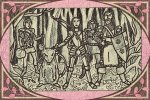MNblockhead
A Title Much Cooler Than Anything on the Old Site
It is far more accessible than any other edition to date. Simple, solid, streamlined rules with a very light and focused production schedule allowing for easy entry into the community at any given time. Open exposure and endorsement over social media outlets, along with online streaming and support. 5e has everything going the right way for new players, and old players who may have felt left out by the departure of classic designs during 4th edition's brief tenure. How could it possibly fail?
Don't get me wrong, though. I am not a fan of the game. To me, they played it too safe, and that is boring and uninteresting to me. I am no longer in the target demographic. I have played the system for many years since the early 80s when it was never as popular. My best experiences happened during that brief period of dangerous innovation in 4e.
Now I have discovered more sophisticated and satisfying games better suited for my personal style of gaming and narrative. And I cannot help but look at this good, solid, accessible, and popular edition and think "It's so... basic!" It doesn't innovate. Everything they do has been done before. And it's the same treadmill I have seen with 4 previous editions and various clones.
These aren't terrible things as evident by it's great success, but I only speak for myself. And for me, it is the end of a decades-long relationship. So while I applaud the achievements of this edition, I do not celebrate nor partake in it. But I do have my fun with it. And I am much happier now having mastering a system that I feel is far superior in many ways, and enjoying the heck out of it!
I can see that. Like anything, if you are a long time fan of something, your tastes get more refined and you require more out of a product to get the same enjoyment. I'm a terrible and aging skiier. I get a thrill as risking my old bones on a green or blue hill, whereas experienced skiiers will be bored with anything less than a black diamond hill.
I don't have a lot of time to play TTRPG. I have one 8-hour game with adult friends each month and I hadn't played a TTRPG since 1990. It still tool work for me to absorb and be able to run 5e games and its luster hasn't faded for me yet. But it has increased my appetite. Yet, rather than go to more crunchy games like Pathfinder or more tactical games like 4e, I am instead drawn to far simpler, more narrative, and just weird games in other genres.
Some of my favorite TTRPG experiences outside of 5e after by rebirth as a gamer have included:
1. A session of "Gene Hackman" that I joined via Kickstarter at the tail end of a business trip.
2. A game of InSPECTREs that I ran with a couple old friends.
3. Playing No Thank You, Evil! with my sons--which has made me curious about advanced Cypher system games like Numera and The Strange.
4. Grim, I bought the grim card deck from DTRPG and integrated it into my DnD game as a kind of mini game. When they went to the Feywild, I swapped DnD mechanics for Grim mechanics to capture the unnerving, dangerous, and surreal nature of the plane. After they "acclimated" they went back to normal DnD mechanics, but mechanics like Grim and Dread are much better at building suspense.
5. I've run the new Paranoia edition. The rules are half-baked and poorly described in some parts, but I love the flavor of the game.
But those are all one-nighters. 5e is my steady date.

